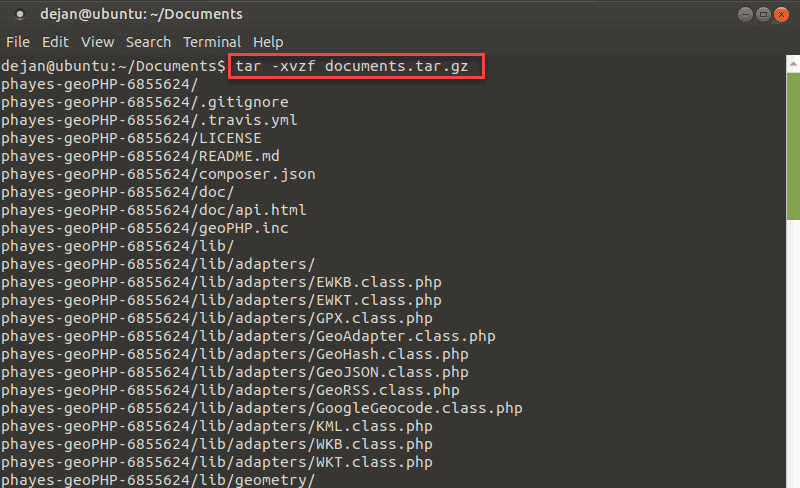

Please don’t reply with tar -zxvf *.tar.gz (because that does not work) and only reply with “doesn’t work” if you’re absolutely sure about it (and maybe have a good explanation why, too).Įdit: I was pointed to an answer to this question on Stack Overflow which says in great detail that it’s not possible without breaking current tar syntax, but I don’t think that’s true. we’re all blind and it’s totally easy to do - but I couldn’t find any hint in the web that didn’t utilize for or find or xargs or the like.
#UNTAR TAR GZ HOW TO#
someone knows how to use the -M parameter that tar suggested to me when I tried tar -zxv -f a.tgz -f b.tgz.there’s a strange fork of tar somewhere that supports this.I’m asking this question rather out of curiosity, maybe The same command can be used to extract tar archives compressed with other algorithms, such as. tar auto-detects compression type and extracts the archive.
#UNTAR TAR GZ ARCHIVE#
(And no, there’s nothing wrong with for, I’m merely asking whether it’s possible to do without.) To extract a tar.xz file, invoke the tar command with the -extract ( -x) option and specify the archive file name after the -f option: tar -xf. untar is used to refer to extracting the entire contents of a tar archive.
#UNTAR TAR GZ INSTALL#
I’m an experienced Unix user for several years and of course I know that you can use for or find or things like that to call tar once for each archive you want to extract, but I couldn’t come up with a working command line that caused my tar to extract two. Install the gz package and use the gz - filename command to uncompress it.
/GettyImages-530054605-89745103f2924d15af7949677eb28e22.jpg)

If you have any questions about this information, please submit a Technical Support ticket.I was wondering whether (and, of course, how) it’s possible to tell tar to extract multiple files in a single run. It first helps the user to extract or in other words unpack files in the compressed mode and once the unpacking or. This command is used for 2 specific utilities in file operations. Here are examples of how to extract the contents of a tar.gz and a tgz file:Īnother resource is the GNU Tar home page. Untar is defined as a command which enables users to extract files that are compressed with tar, tar.gz, tar.bz2 formats of compression. Here is an example of how to extract the contents of a tar file: Here is an example of how to extract the contents of a gzip file: If needed, command line tools for gzip and tar files are available in a collection of Win32 command line GNU utilities and are also available from the gzip home page.
#UNTAR TAR GZ ZIP#
If you need to extract the contents of a complex archive, such as a tar.gz or tgz file (each being an archive with a tar file inside), you would need two commands:Įarlier versions of the add-on only support creating and unzipping Zip files (.zip or. tar file, enter: For more information, refer to the. tar file, you must extract the files by entering: Alternatively, to do this in one step and avoid creating the intermediate. tar.Z files, at the shell prompt, enter: Use the ls command to check the resulting files. For example, if you need to extract the contents of a tar file or a gzip file, your commands would look like this: If you are on a Unix system, to uncompress. For simple archive types, you would use the same type of unzip command that would be used with Zip files. Additionally, version 4.0 can create LHA files. Starting with version 4.0, the WinZip Command Line Add-On can be used to unzip any of the archive types that are supported by WinZip.


 0 kommentar(er)
0 kommentar(er)
